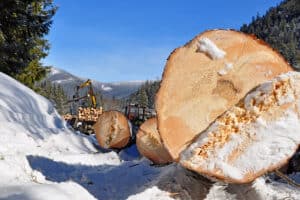Most of the people in America are in agreement on one thing right now: our national economy is a mess. Those who keep tabs on the land markets across the country would share that sentiment for recreational and timberland tracts. From what I experience first-hand inAlabamaand the anecdotal evidence from land professionals in other regions shows that in many locations across the country timberland sales are way down.
The bright spot in the land market right now is good agricultural land. Arable acreage in the Midwest and the Mississippi Delta is selling at all-time highs; bolstered by strong commodity prices and investors like George Soros betting that the demand for food will increase dramatically as the world population grows in the coming decades.
I believe what is happening in the timber and recreational segments of the land market right now is akin to a major logjam in a river. We have many factors that have combined to form a major blockage in the flow of land sales that were happening from 2004 to 2007. We all know that what happens in the global economy now trickles down to our local markets. Thomas Friedman is correct, “The World is Flat”, and so there are many more forces at work that affect our local land sales than even a decade ago. I am not smart enough to identify and address even a fraction of those factors, but there are three main logs in this jam that I think we can put our finger on that we have some influence over. Running a successful business right now means you have to focus on what you can influence, and work hard at tilting the table your way.
1. Behavioral Economics of Sellers
Understand your product (land) and work to understand people. Markets fluctuate, circumstances change, but human nature is relatively constant. Personalities vary, but there are traits that most people share in common when it comes to their money and assets.
Most landowners will feel like their property is worth more money than the exact same type of property across the road or next door. It is worth more money for one very important reason: it belongs to them. This is called the endowment theory, which boiled down is, “mine is worth more than yours because it is mine.”
In addition, human nature makes us hate losing money. The average person has more anguish over losing $1000 in a deal than they have joy over making $1000. This is called the risk aversion theory, and that coupled with endowment is why so many sellers say, “I am not going to give my land away.” It is as natural a reflex as your knee bouncing when tapped by a doctor’s mallet.
In an investment, if you had a 100% chance of making $5,000 or an 80% chance of making $6,000 which would you choose? If you had to sell and you had a 100% chance of losing $5,000 or an 80% chance of loosing $6,000 which would choose? Most people choose option A in the first question and option B in the second. That is exactly the opposite of what a smart investor would do. The upside is almost certain in the first question and the downside in the second has a strong chance of increasing your losses. So choosing option B in the first example almost assures you of making 20% more money, and you are almost certain you will lose your $5,000 plus 20% if you chose option B in the second example. We make those decisions because we naturally have an aversion for risk. (I found a similar example in a TD Ameritrade investment class I took this year.)
It is our job to provide the most recent and accurate information about what a landowner’s property is worth in our professional opinion, and then help them make the decision as to whether they are willing to sell their land in this market.
2. Financing Difficulties
Securing financing for rural land is more of a challenge than it was five years ago. Land professionals need to be more educated about the possibilities of financing acreage. Having preferred lenders to recommend potential buyers to is a good start, but having a working knowledge of USDA Rural Loan Programs, owner financing options, and 1031 exchanges are also very helpful.
3. Lack of Consumer Confidence (Scared Buyers)
The plain truth right now is that people are uncertain about the future of our country and are afraid to turn loose of large amounts of money. A recentGalluppoll showed that 81% of Americans are dissatisfied with the way our government is being run, and they believe that $0.51 of every tax dollar is being wasted. That fear is causing paralysis when it comes to making major purchases.
However this distrust of government and fear of the unknown is opening markets for mini-farms of 10 to 20 acres where families can grow their own food and get out of cities. The 2010 census showed that over 83% of Americans now live in the 331 largest metro areas, leaving roughly 17% of our populous in rural areas. Land professionals have a unique knowledge that 83% of the population are not experiencing on a day to day basis. That means the odds are highly in our favor when someone is ready to purchase rural land. By showing a prospective buyer that investing in land is historically safer and a better investment than buying stocks or gold, you put them at ease with the purchase and increase your probability of making a sale.
The flow of the land market is shifting. Just as a logjam in a river causes the flow to change course, so the cumulative effects of the global economy are shifting rural land buying trends right now. Farmland in the Mississippi River Delta and Midwest is at all time highs, Florida citrus farming acreage is down 36% since 1996, China’s imports of pecans have created a demand for pecan orchards; these are all trends that are happening because of forces outside their regions. When a stream changes course it erodes part of the old bank and makes a new shoreline. The same is true in the land market. This logjam is creating new opportunities. It does us no good to pine for how things used to be, all of that has been washed downstream. This logjam is moving our industry in new directions and also building up demand for when the economy recovers. Opportunities to make money are out there. This logjam may be just the thing that helps take your business to the next level if you are prepared and are willing to accept the change.
This content may not be used or reproduced in any manner whatsoever, in part or in whole, without written permission of LANDTHINK. Use of this content without permission is a violation of federal copyright law. The articles, posts, comments, opinions and information provided by LANDTHINK are for informational and research purposes only and DOES NOT substitute or coincide with the advice of an attorney, accountant, real estate broker or any other licensed real estate professional. LANDTHINK strongly advises visitors and readers to seek their own professional guidance and advice related to buying, investing in or selling real estate.










Perfect comparison to a “logjam”. You are absolutely correct. The market will recover and come full circle. The land agents that are easily adaptable and accepting of change will flourish. Well-written article!
Great article Jonathan. I’d sure would love to see an “ALC” beside your name someday.
Keep up the good work and keep promoting Land…the last investment!
You “hit it right on the head” as usual.
Keep up the good work.
Jennifer- Thanks. I really feel like people need to jump on board with what is happening now, and not how it used to be. The Good Ole days are gone, and the Good New Days are here.
Lou- Thanks for reading. I’m working on my ALC. Need to put in my time before I can get the accreditation. Also need to make some more sales.
Jay- Thanks man. I hope you’re enjoying the 80 degree weather you guys got last week! Pretty warm for Wisconsin in October, huh?
One observation I made this weekend while reading through the 2011 Landthink Survey is that the top 3 challenges in the opinion of those surveyed was Sellers with unrealistic prices, financing, and scared buyers.
That is validation to my point from the perspective of those responding to the survey. It’s nice to not be way off base every once in a while.
I’m a buyer looking in SE VA since last Thxgiving & now NC & you are correct. When we have interest (after pre-screen or actually after seeing a prop) we experience: 1) sellers, not agents are dictacting price and there are NO good or reasonable CMAs, 2) With #1 said, and hardly anything sold for a baseline, I don’t want to be the trend setter.
Well said, Jonathan!